Ho Quang Loi: The path of journalism, the path of culture - Part 3: Teachers, friends
(Baonghean.vn) - Professor, Hero of Labor Vu Khieu commented: "Ho Quang Loi is a journalist, writer, steadfast politician, and erudite culturalist."
Many times, randomly, in the story with me, Ho Quang Loi often talks about his teachers and friends. Teachers on the podium and in real life. Famous and unknown friends. Certainly, they are always a part of his life, having different impacts on his path. That seems to be the general rule of life, but with Ho Quang Loi, things happen differently.
It is only natural that Ho Quang Loi often mentioned the teachers in his hometown of Quynh Doi, Quynh Luu during his difficult childhood years. His father died early when he was in second grade, he was fortunate to have teachers who loved and cared for him. Teacher Van Thi Huong, Principal of Quynh Doi Secondary School, the sister of famous teacher Van Nhu Cuong, took care of Ho Quang Loi from the old textbooks, comforted and encouraged him in the most lonely days. More than half a century has passed, but he still has lingering emotions about his hometown fields from the poem "The Head Teacher" by poet Hoang Trung Thong - a great poet, from the same village of Quynh Doi. It seems that the touching voice of teacher Van Thi Huong still echoes in his mind when she passionately taught that poem in the thatched-roof classroom surrounded by a high earthen wall built up to the roof to protect against American bombs. Ho Quang Loi thought that poet Hoang Trung Thong was writing about the head of the Quyet Tien Cooperative and the fields of his hometown Quynh Doi.
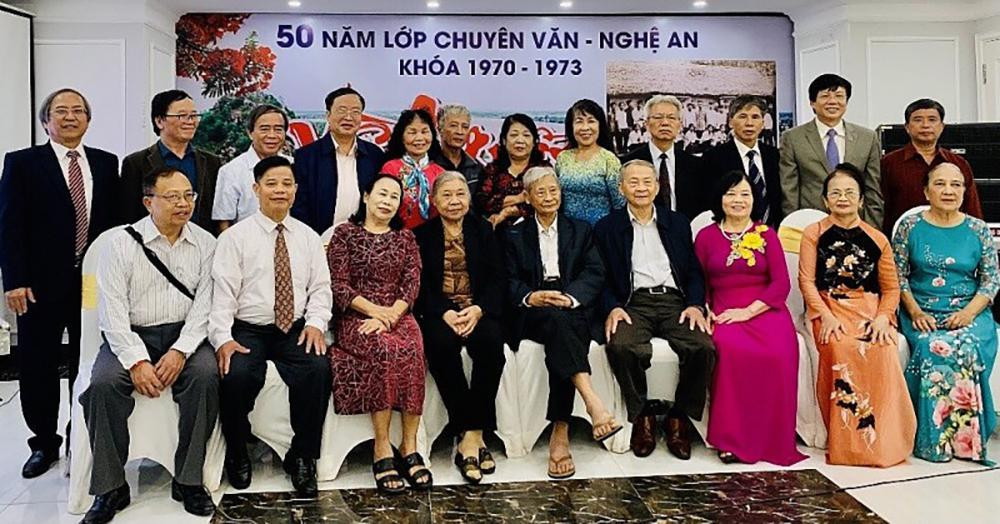 |
| Journalist Ho Quang Loi (second from right, back row) and classmates from Nghe An Literature class at the meeting with Literature teacher Phan Huy Huyen (sitting in the middle) after 50 years. Photo: Document |
The day he was called by the Nghe An Department of Education to join the Northern Literature Competition team, the entire Quynh Doi Secondary School only had a few teachers with bicycles. During the fierce American war, the training class for the provincial Literature team was held in Vo Liet commune, Thanh Chuong mountainous district. A few days before, Ho Quang Loi's calf was pierced by a sharp harrow blade while he was harrowing in a deep field. It was severely infected, swollen like a banana stalk, and he could not walk. Faced with that situation, the school assigned two teachers, Ho Si Nghiem and Le Xuan Hoan, to take turns cycling nearly 100km on Ho Quang Loi's shoulder to Thanh Chuong. When they got there, it was raining heavily, the road was muddy, and the teachers took turns carrying Ho Quang Loi to the gathering place. He felt sorry for the teachers, so he kept crawling down, demanding to go by himself, but the teachers' stern faces reminded him to listen.
Now, when he has become famous, he has enough experience to appreciate even more the gestures of affection, the power to move, the power to lift people up, the meaning of a lifetime like that. I wonder, without that kind help, what would happen to people like poor student Ho Quang Loi? The story of the couple teacher Ho Thi Thao and teacher Dinh Nhu Hoan is the same. He went to his homeroom teacher's house to improve his writing but was directly taught and polished by her husband, teacher Dinh Nho Hoan, a famous literature teacher in Nghe An province. The teachers' care during those hours of practicing literature planted horizons in his soul, giving wings to his passion and youthful dreams. Perhaps those first literary imprints contributed to helping Ho Quang Loi begin to form his "cultural path" later on.
Why do many famous and successful students in our country often have special emotions when remembering their time in elementary, primary or secondary school? Ho Quang Loi said, now Ms. Thao and Mr. Hoan are very old, he is nearly 90 years old, but I feel that his intelligence is still as sharp as when he was young. Every time I go back to my hometown to visit and give my teachers a newly printed book, I am very happy, even happier when in the peace of the countryside, teachers and students talk endlessly about literary stories, current events both in the country and the world. The happiest are the phone calls from my teacher from my hometown, saying that he just saw Ho Quang Loi on TV, then he takes the opportunity to say a few things about the book he just read or a recent cultural event that happened. Ho Quang Loi admires his teacher as an idol for his wisdom and love for his students.
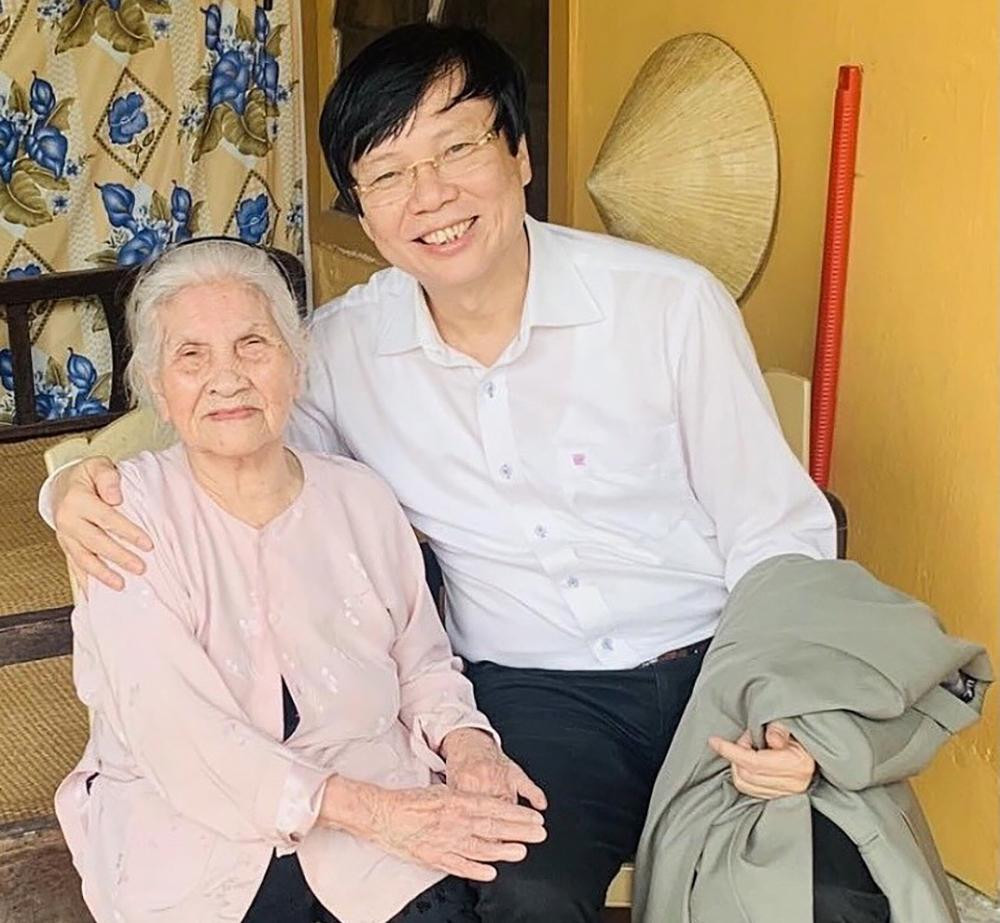 |
| Journalist Ho Quang Loi met again with Mrs. Ho Thi Nguyet, nearly 100 years old, wife of teacher Nguyen Huy Ty, Headmaster and Literature teacher of Nghe An Literature class, 1970-1973. Photo: Document |
In the Literature class of Nghe An province, the literature teacher was Mr. Nguyen Huy Ty, a person who was very good at French, with an elegant appearance, who left a very deep impression on Ho Quang Loi. When he was young, Mr. Nguyen Huy Ty was nicknamed "Mr. Tu Ty" because he passed the baccalaureate exam. Mr. Ty fell in love with a beautiful and virtuous young girl, and then married her named Ho Thi Nguyet, from Quynh Doi, whose house was right next to Ho Quang Loi's parents' house. In the fall of 2020, during a pilgrimage with friends to Nghi Truong commune, Nghi Loc district to burn incense in memory of Mr. Nguyen Huy Ty on the occasion of the 50th anniversary of the Literature class of Nghe An, it was very touching that Ho Quang Loi met again Mrs. Ho Thi Nguyet, who is nearly 100 years old this year, but is still healthy and clear-minded. Half a century has passed, he hugged her, tears streaming down his face, mentioning his hometown of Quynh Doi and his relatives in Dong hamlet,...
Ho Quang Loi confided that, when he was in the Literature class, he felt that when Mr. Ty entered the class, it was the time when the beauty of literature began to shine. The beauty of poems and essays by domestic and foreign authors appeared before the students' eyes, shimmering like a watercolor painting. If a student wrote a good sentence, the teacher considered it his joy; if a student had new, creative ideas in writing, the teacher was enthusiastic, passionate, and encouraged him. Until now, Ho Quang Loi and his friends all remember clearly the literature classes with Mr. Ty. When he taught the Tale of Kieu, an emotional space opened up... "The sparkling water reflects the sky/ The citadel is built with blue smoke, the mountains are exposed to golden light", humming that verse, Mr. Ty half-closed his eyes and then looked up to the sky and asked his students: "This is one of the best verses, isn't it?". “We looked forward to Mr. Ty’s literature class, we loved him so much that we forgot about hunger, loved him so much that we only wanted his literature class to be at the end of the afternoon, so that we could listen to his voice and forget about the hunger that was growling in our stomachs,” Ho Quang Loi told in a serious manner, without any humor. “Using literature to fight hunger” is a story that has only been told by students of Nghe An Literature class!
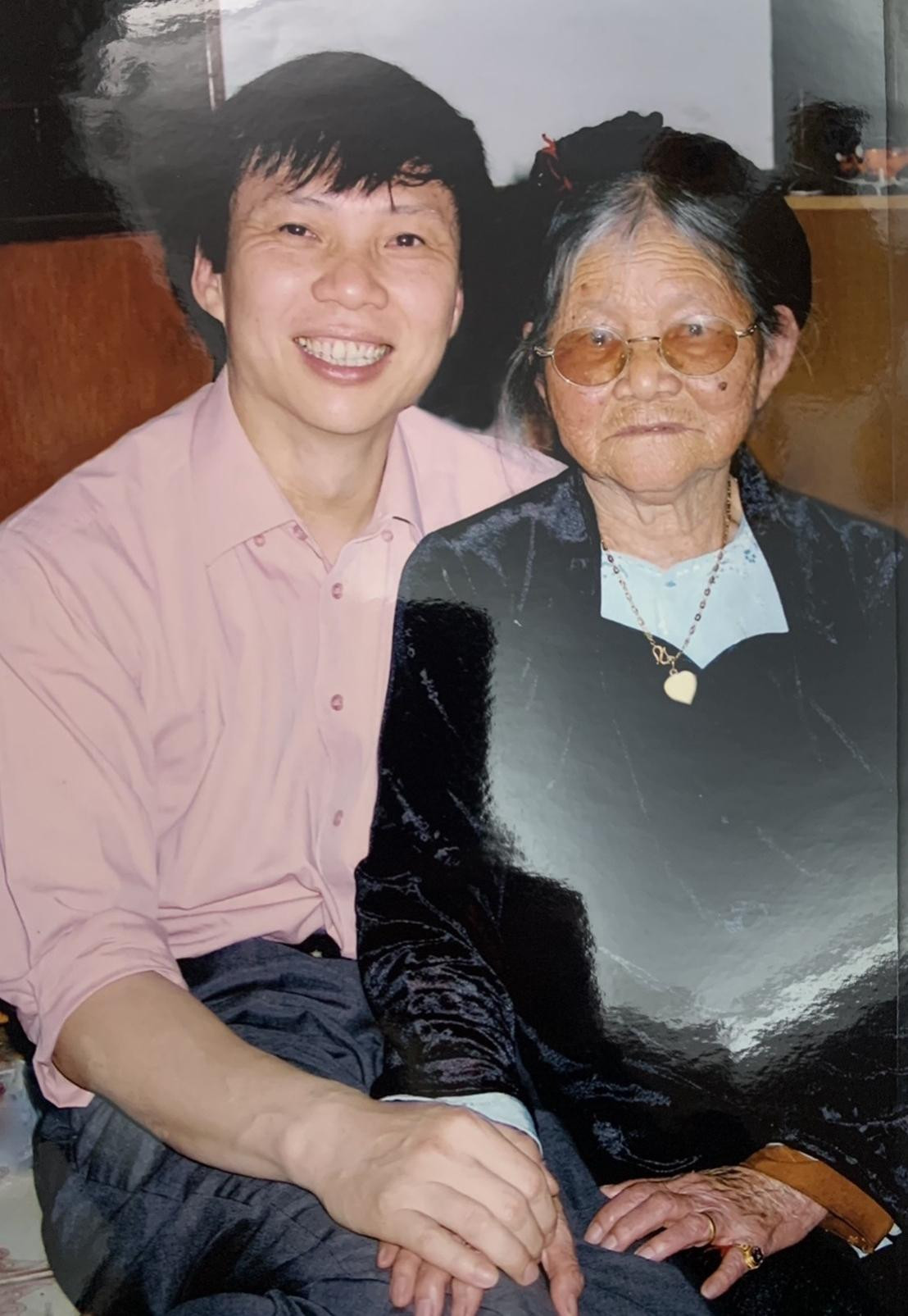 |
| Journalist Ho Quang Loi on a visit to his mother - Mrs. Ho Thi Niem. Photo: Document |
In the summer of 1971, American planes bombed and burned down classrooms and bamboo huts in Nghi Trung commune, Nghi Loc district. Luckily, all the students in the class were on summer vacation in their hometowns, so everything was fine. By the middle of grade 9, the Literature class had to evacuate to Nghi Van commune (Nghi Loc district). Some time later, seeing that it was not safe, Nghe An province decided to evacuate this class to the mountainous district of Thanh Chuong. Unexpectedly, here, Ho Quang Loi's Literature class was almost hit by a B52 carpet bombing on a winter night in 1972. As if protected by fate, no one in the Literature class was harmed even though the bombs fell right next to where he and his friends were staying. That night, while sleeping on a wooden bed in a farmer's house in Thanh Linh commune, Ho Quang Loi suddenly heard a terrifying screech, then a flash of blue lightning. By natural reflex, he dove to the ground and crawled under the wooden bed. As soon as the series of bombs tore through the sky, he rushed out of the house and crawled to the shelter in the corner of the garden. As soon as he got out of the door, all the ironwood doors collapsed, crushing the bed where he had just been hiding. The second series of bombs shook the earth just as he crawled into the shelter, his knees were torn, blood was pouring out. Then the third series of bombs, the A-shaped shelter seemed to sway. In the morning, looking at the three long lines of bomb craters, many people said, if it had been just a little bit off, the entire Literature class could have been "wiped out".
That was the year Ho Quang Loi's Literature class was attached to the homeroom literature teacher - poet Phan Huy Huyen. On November 20, 2020, from Yen Thanh district, teacher Huyen, who is over 90 years old, still returned to Vinh to honor the reunion on the occasion of the 50th anniversary of the Nghe An Literature class. Almost all night, teachers and students recalled the memories of the difficult days, the deep affection and pride in Thanh Chuong land. The most difficult and memorable was the trip of his class to the mountain to cut bamboo, then build rafts to go down the Giang river, with many dangerous rapids, and during that trip, a girl named Pham Thuy Ngan had a high fever and passed out, making the whole class worried.
During his years studying abroad in the West, it is impossible not to mention the Romanian professors at the University of Bucharest, including Ms. Mariana Repetianu, who guided Ho Quang Loi in writing his graduation thesis titled "Psychological Analysis in Stendal's Novels" - a thesis about the famous French writer, the author of the immortal Red and Black, which he defended excellently, achieving a perfect score of 10. Ho Quang Loi always remembers the day he was preparing to leave Romania to return home, he was invited by Professor M. Repetianu and her husband to visit and have dinner. That day, the teacher herself made Romanian national dishes, and he made Vietnamese spring rolls. When saying goodbye, the teacher was moved, tears streaming down her face, and gave him a book, her research work, with the words: "With love and dedication to Ho Quang Loi, my outstanding student".
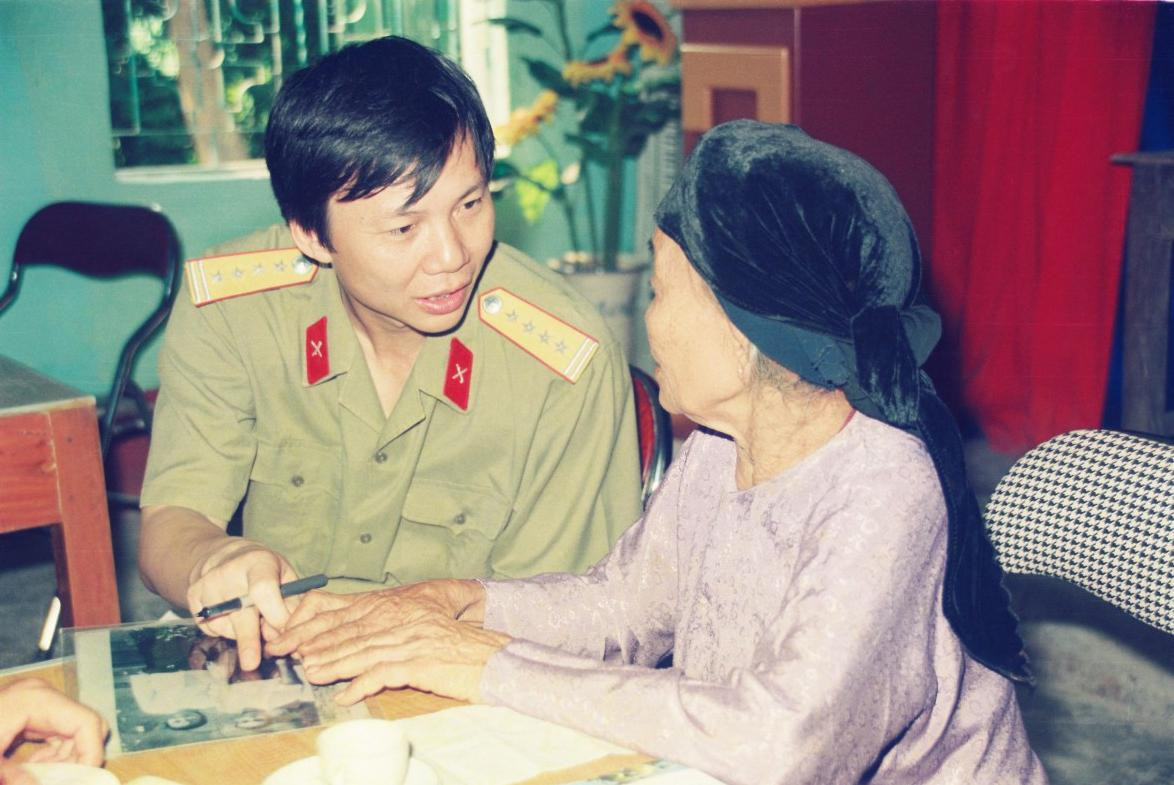 |
| Journalist Ho Quang Loi met the mother of one of the 10 Lam Ha girls who died in the artillery battle in 1967. Photo: Archive |
Of course, on a very long path of learning and learning everywhere and at all times like him, I think Ho Quang Loi will continue to tell endless stories about teachers who taught high school, university, foreign languages, military knowledge, diplomacy, advanced theory, journalism... Therefore, my article will probably be endless. Therefore, I took the initiative to ask, to ask him to confirm, was the first teacher in journalism, Major General Tran Cong Man, Editor-in-Chief of the People's Army Newspaper? Hearing that, his face lit up with joy and then he became sad, whispering "Yes, he passed away a long time ago...". The conference on the 20th anniversary of the death of journalist Major General Tran Cong Man affirmed that journalist Tran Cong Man (October 20, 1925 - March 25, 1998) was not only an excellent Editor-in-Chief but also an exemplary teacher, a compassionate leader. He always had an intellectual capacity, a capacity to respond courageously, an ability to persuade others. In an article written by Ho Quang Loi about Tran Cong Man, it felt like the author not only expressed his sincere and deep gratitude, but also through carefully selected words, Ho Quang Loi honored his great teacher with the respect of a student: “In my 40 years of journalism, the more I understand the writing profession, the more I feel the hardships of it, the more fortunate I feel to work under an Editor-in-Chief like General Tran Cong Man and to meet a teacher like him. The journalism awards of our generation of journalists, including the 9 national and international journalism awards for financial and political writing that I was honored to receive from 1991 to 2009, all owe their merits to Editor-in-Chief Tran Cong Man, all have his shadow in the way of posing problems, in the arguments, in the writing style…”.
He said that he learned from Editor-in-Chief Tran Cong Man, of course, the journalism profession, but he also learned from him the way of persistently acquiring knowledge every day, the serious lifestyle, the affection between superiors and subordinates like brothers, like father and son; learning from him was not learning in a day, but learning for a lifetime! That teacher has been gone for more than 20 years, but in the subconscious of love and admiration, student Ho Quang Loi has poured out his emotions on his pen, writing excellent sentences, bringing to life the beloved image of General, Editor-in-Chief Tran Cong Man: "I still see his figure leisurely walking across Ly Nam De street, his silver hair like clouds under the green canopy of the familiar old tamarind trees, as if still seeing under the late night light, his pen rushing as if flying on the manuscript pages, chasing after the flashing ideas, as if still hearing his warm, calm voice in the simple stories about life, about career. As if still here is his figure gently going up and down the wooden stairs worn by the years, holding the manuscript in his hand, his face pensive as if thinking about something...". Reading such poignant, cinematic sentences, we are happy for Ho Quang Loi, for the generations of journalists of the People's Army newspaper who lived and grew up thanks to a golden age under the guidance of Editor-in-Chief - teacher Tran Cong Man.
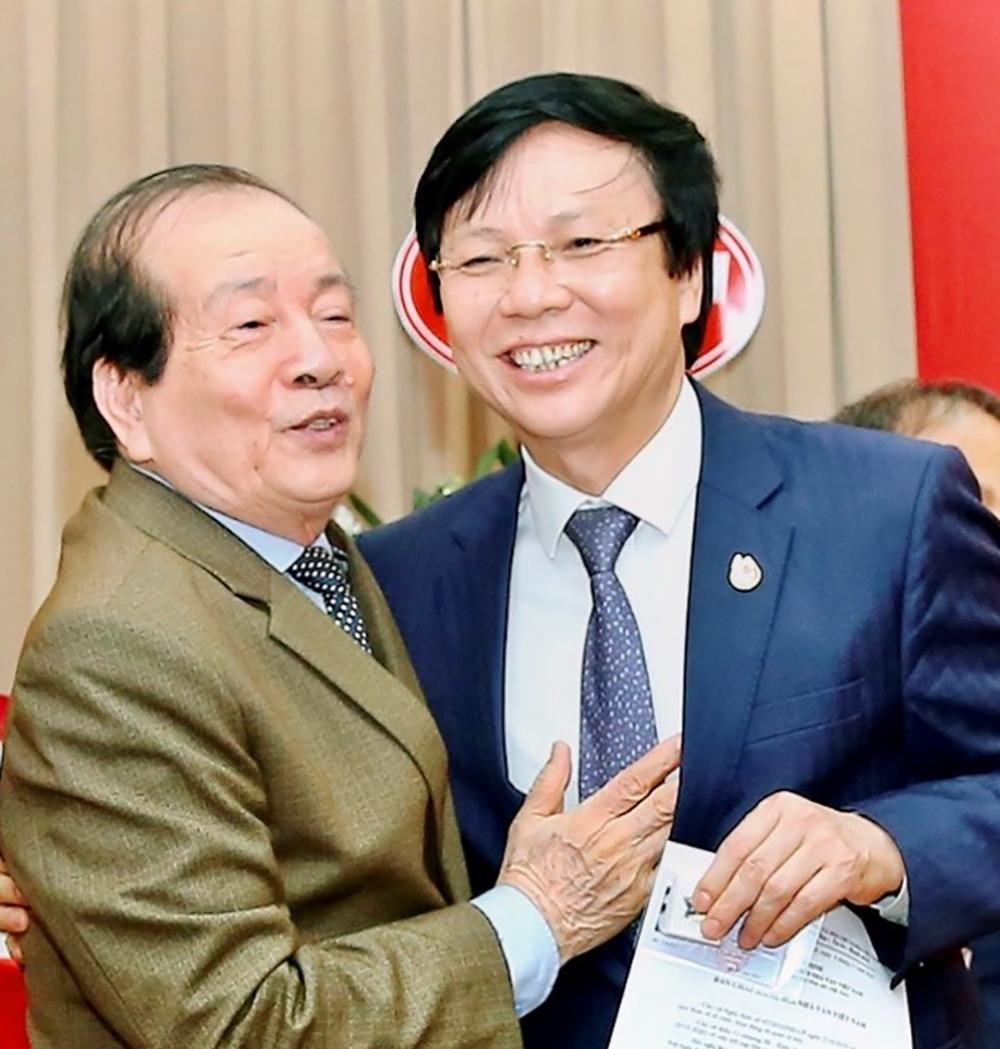 |
| Poet Huu Thinh congratulated Journalist Ho Quang Loi on being admitted to the Vietnam Writers Association. Photo: Document |
I think Ho Quang Loi also had many close teachers, according to his moral concept. They could be cultural figures, profound intellectuals, famous senior journalists not only in the country, leaders who inspired him with ideas and styles... They were highly respected, older, but considered him a friend, exchanged ideas, gave advice, appreciated each of his journalistic works, loved, respected his talent, and sympathized with each of his words. We can mention the Culturalist, Labor Hero Vu Khieu, Journalist - Culturalist Phan Quang, Poet Huu Thinh, Poet Bang Viet, Journalist - Secretary of the Hanoi Party Committee Pham Quang Nghi, Historian Duong Trung Quoc, Musician Hong Dang... Please allow me to feel like that to make a very mechanical list, perhaps there are many other teachers that I cannot know... That is a rare happiness for a person who has spent his whole life doing one job - holding a pen to fight - like Ho Quang Loi, and is lucky to "play" with such respected intellectuals. Once I asked Ho Quang Loi if we could consider them as old friends, he refused: "No, no, uncle, they are really my teachers...".
But the famous journalist Ho Quang Loi had teachers that few people had the opportunity to have. If I were to tell you about them, you would be surprised, they were the teachers in capital letters - the people in the plowing team in his hometown Quynh Doi, Quynh Luu over 50 years ago. His father died early, his older brother volunteered to join the army, at over ten years old, Ho Quang Loi had to drive buffaloes to plow to calculate the points to get rice to help his mother feed the whole family. Who said plowing was easy, especially for a boy in his growing age? Thinking back to the story of a skinny boy trying to hold the plow firmly behind the buffalo, controlling it to turn the soil in the middle of a vast rice field, the writer of this article would find it hard to hold back his emotions. If there was no loving plowing team in Quynh Doi teaching him how to hold a plow mat firmly and flexibly, how to lift the plow, how deep and shallow to turn the soil, and how to make a straight plow line without leaving any soil behind. Then there was the harrowing, how to harrow less times so that the soil would loosen quickly and absorb water early... then who knows how Ho Quang Loi would struggle? No one taught him, maybe the student could only stand by the edge of the field and cry in sadness! However, the teachers in that plowing group taught Loi all the first operations, took care, encouraged, guided him affectionately, even walked beside the little student to guide the first plowing lines like the primary school teachers in the village school taught him how to hold a pen, practice writing, practice reading, practice counting. Teacher Ha taught the first class, Ms. Lac taught the first class, Mr. Bao taught the second class, Mr. Cau taught the third class, Mr. Nghinh taught the fourth class, until now he still remembers each person's face clearly, even though nearly 6 decades have passed. Their loving, tolerant eyes helped him grow up, believing in himself. And so, the plowing team that day was not only his grandfather, uncle, or aunt, but also the teachers, the "old farmers" who gave him not only the story of farming but also love; tolerance; faith in people; stories of apprenticeship and training; the reason for living in the countryside and throughout life.
It turns out that even the seemingly easiest job of a farmer, plowing, must be learned, taught properly, and mastered in order to be respected. Now, many people in the plowing group in Dong hamlet, Quynh Doi have passed away, leaving only Mr. Ho Sy Chung, who is 95 years old, and Mr. Ho Duc Van, the former head of the cooperative, who is now over 90 years old. Every time Ho Quang Loi returns to his hometown, he always visits and meets the two old people who still happily chat with their student - group member like in the old days. Oh my gosh, I told Ho Quang Loi, that is truly a great and rare happiness, a "unique" memory like a priceless spiritual asset.
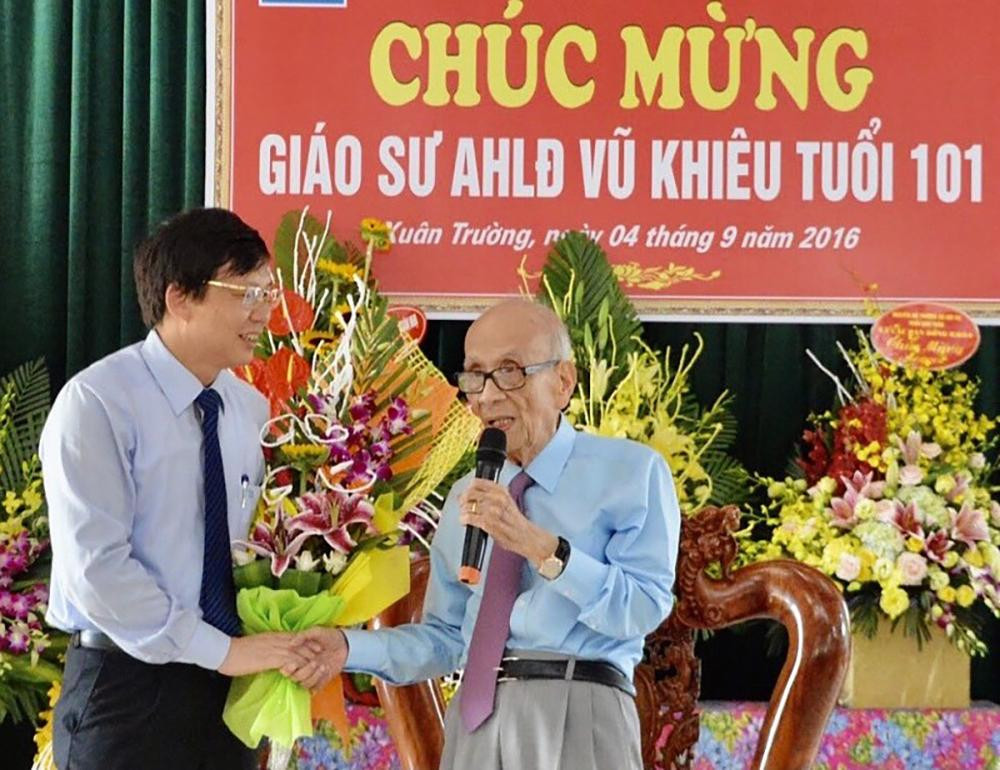 |
| Journalist Ho Quang Loi congratulates Professor Vu Khieu on his 101st birthday. Photo: Document |
Ho Quang Loi has had close friends since childhood and has remained loyal to him until now. I know a classmate of his from high school, living in Hanoi, when he was down on his luck, his personality was also difficult to please, giving rise to shortcomings in his way of life. One time, his friend came to visit but he was not home, his daughter was very angry because her father's friend shouted loudly, shouted many times, and gave him random orders, the whole family did not understand what was going on and ran around in a panic. Later, we found out that he asked for "a piece of paper and a pen to write a letter to Loi". According to Ms. Dang Phuong Thao, Ho Quang Loi's wife, he sat solemnly at the writing table in the living room, sat in deep thought for a long time before putting down his pen, her daughter stood there looking in fear, he shouted "don't walk around, it's confusing, let me concentrate". After finishing writing, the friend put the letter in an envelope and said goodbye and left. Ho Quang Loi came home from work and opened the letter to read the words "I came to visit, but Loi was away", he smiled happily, feeling sorry for his friend, understanding his friend's intentions! He still pampered his friend, pampered him to the point that every time he came to his house, that friend was always warmly and affectionately welcomed! Another friend was a writer, often had quite extreme statements. But with Ho Quang Loi, he only confided gently, not loudly. It can be said that he treated his friends' shortcomings with kindness, never causing anyone to hurt. He also had many other dear friends, both at home and abroad, who were close to him and shared in his career and daily life. They had many humane impacts on his career as a journalist. But due to the scope of this article, I would like to talk to readers on another occasion...
I would like to mention a special friend of Ho Quang Loi, his life partner and wife, People's Army Colonel Dang Thi Phuong Thao. She was born and raised in Hanoi, and studied abroad in the former Soviet Union's Ukraine (1974-1979). Once, when she had just arrived from Hanoi to study in Kharkiv, she was "influenced" by the Nghe An student association studying in this republic, sending senior students to welcome new students from the country. Because she was in the same group, Thao was supported by her seniors from carrying suitcases to buying tickets and taking them to the dormitory. During her studies here, the Nghe An students in Ukraine and some other Soviet republics often visited each other at school and helped the sisters. Phuong Thao was also invited to join this association, so naturally, the female student in Hanoi became close to the Nghe An students, including those who were in the same Literature class as Ho Quang Loi, so in their conversations they often mentioned him with beautiful memories and impressions. Ms. Thao only knew that, because at that time Ho Quang Loi was studying abroad in Romania.
However, in 1979, after graduating and returning to the country, both Dang Thi Phuong Thao and Ho Quang Loi were mobilized into the army, assigned to the same training company. As if by fate, one time, a group of new recruits who had studied abroad were assigned to do field work in Ninh Binh province to help the people, perhaps to "militarize" the "petty bourgeois" students returning from the "dairy land". The whole group brought guitars, and after work hours, they happily participated in cultural activities. One day, the whole group was assigned to go down to the fields to help the people pull out rice seedlings and plant rice. Ho Quang Loi's group was assigned to pull out rice seedlings, Dang Thi Phuong Thao's group was assigned to plant rice. Of course, the girls from Hanoi had never planted rice before, Thao and the girls were clumsy. Seeing that, Ho Quang Loi said, "Do you girls agree to change jobs, I will go plant rice for you?". Everyone thought Ho Quang Loi was joking, because with the appearance of a student returning from Romania, what could he plant? But unexpectedly, Ho Quang Loi took the initiative to change jobs. He rolled up his pants, waded into the field, quickly grabbed a bunch of rice seedlings that were ready behind his back and started planting. He planted and backed away, one hand planting the seedlings, the other hand planting quickly - very typical farming movements, the rows were straight and even. Everyone was surprised, cheering loudly. Some farmers from the neighboring fields also looked over to watch. As for Phuong Thao, she was surprised and remembered the story her friends often told about him in Ukraine...
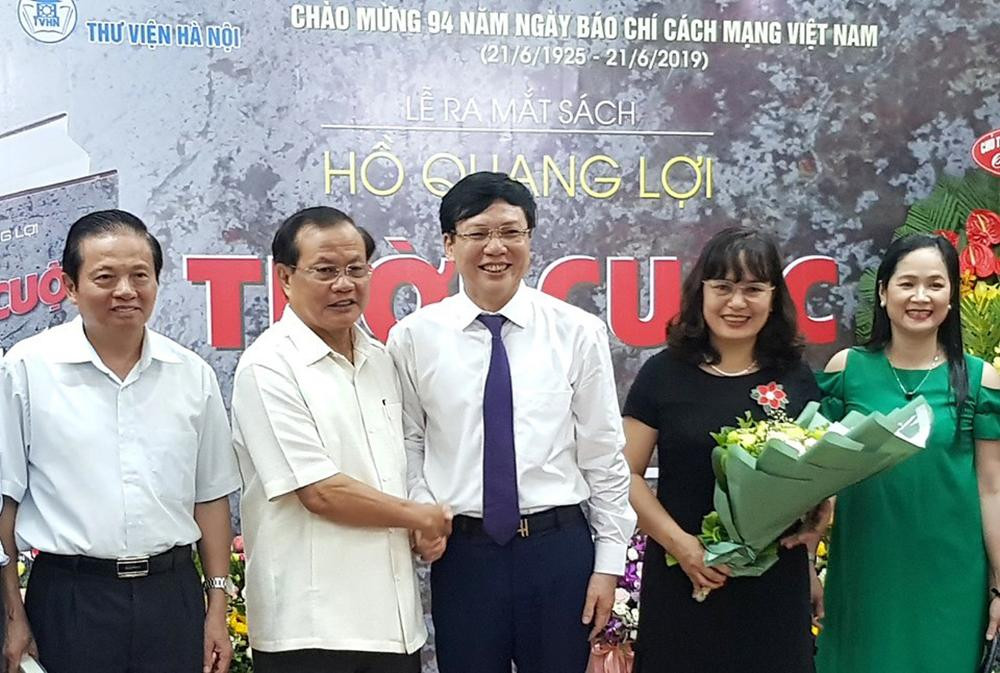 |
| Ho Quang Loi with Dr. Pham Quang Nghi and friends at the book launch ceremony of Current Events and Culture. |
After that, during many field trips, in their working relationship, the fate between the two people gradually grew, their feelings also fermented and then "love came into their life without warning". The day they were preparing for the wedding, there was a funny story that every time Ms. Phuong Thao recalled, she would tell it happily, laughing until she cried at the unique memory. It was early 1981, on the day of the appointment with the bride's family, Ho Quang Loi's family came from Quynh Doi to arrange the engagement ceremony combined with the wedding. Her brother, veteran Ho Quang Thang, and mother Ho Thi Niem took the train from Cau Giat station to Hanoi, bringing two chickens. Unfortunately, the train was packed, and one chicken was crushed to death. Unable to find another chicken to replace it, the mother and son had to bring the remaining chicken and several kilos of sticky rice to Ms. Thao's parents' house to talk. In the opening story, Mr. Ho Quang Thang also told the truth. Hearing the story, Thao's parents were originally from Hanoi, but both were military officers, so they understood the subsidy period life at that time and the culture of each region very well. They just smiled happily: "It's okay, it's okay, one child is like two children"... Ho Quang Loi and Dang Phuong Thao became husband and wife on the first day of marriage, also full of soldierly qualities and simple humanity. She was not only a wife but also a comrade, a friend, a capable collaborator, especially during the years she worked as Head of the Readers' Office of the Military Library, helping him a lot in collecting and gathering his articles in dozens of newspapers in the South and the North, reading manuscripts, and participating very effectively in his book printing and book launches. Their two obedient children also followed their father's journalism career.
Living with a husband who is famous for so many articles, so many books, so much glory, with countless relationships of brothers, friends, guests, but Ms. Phuong Thao still seems to maintain her own style, not obscured by her husband's halo. As a Hanoian, a daughter-in-law of Nghe An, having studied abroad, understanding many cultures, Ms. Thao is naturally attached to her mother-in-law and paternal brothers, to the Ho Quynh Doi family, loved and respected by everyone. I once witnessed Ms. Thao returning to her husband's hometown in Quynh Doi, she was familiar with every corner of the house, housework, and every neighborhood of her husband's family, like a Ho child visiting her hometown. As for him, I clearly felt that after many years of contact, Mr. Loi treated Ms. Thao like a close friend. Each tree has its own flower, each house has its own scene. Surely in the house on Ly Nam De military street, to have success in the career of husband, wife and children, you must have had to overcome many twists and turns in life, on the road with trees and storms, to keep that house peaceful, to build and preserve happiness.
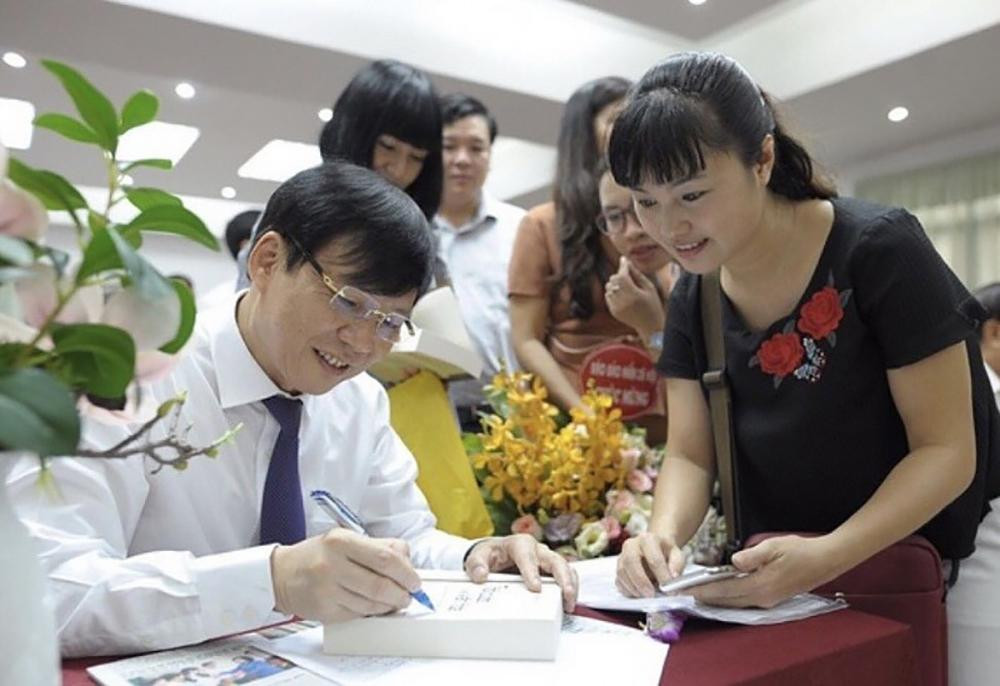 |
| Journalist Ho Quang Loi signs books for readers |
In 1991, on the occasion of the anniversary of the Vietnam Revolutionary Press Day June 21, at the suggestion of the Editor-in-Chief of the Hanoi People Newspaper to write about a good journalist to publish on the traditional day, I thought and chose to write about journalist Ho Quang Loi who had just been awarded the first National Press Award held in our country. In that article, at the end of the article, I expressed my thoughts that Ho Quang Loi was a journalist with steadfast political will, good at his job, fluent in foreign languages to communicate and cooperate with international colleagues, perhaps the Vietnam Journalists Association needed to train and foster Vietnamese journalists in that direction. When I wrote this article, I was working at the Department of Cultural and Ideological Security Protection of the Ministry of Public Security, not yet officially a journalist. At that time, I did not know much about him, even just met him briefly so I did not have the opportunity to get close to him and confide in him. Later, I learned that my article was published on the occasion of his sister's visit to Hanoi. When she read the article about her brother, she was very excited and proud of him. When she returned to her hometown, Mr. Loi bought some more copies of Nguoi Ha Noi newspaper and asked her to give them to his mother and cousin Ho Quynh Doi. Hearing the story, I was also happy about the first article about him.
Now, exactly 30 years later, I have the opportunity to write an article about Ho Quang Loi. Now, due to the time lag, in my opinion, Ho Quang Loi has matured very quickly, matured continuously, and held many positions. But what I would like to say about Ho Quang Loi's maturity is his contributions to the development of revolutionary and cultural journalism.
It can be said that Ho Quang Loi only did one job throughout his life, which was journalism (he was the Head of the Propaganda Department of the Hanoi Party Committee for nearly 6 years, but his journalistic career was not interrupted). Majoring in literature, studying abroad in Eastern Europe, and being assigned to the army, it seemed that journalism had chosen him randomly. And then he remained faithful to it with dedication and seemed to exhaust himself for each page he wrote. I think that the fate of each word, each article, each research project will outlive his life. In that personal creative journey, in front of the paper and keyboard, Ho Quang Loi mobilized his political courage, traditional values, Vietnamese culture (including the Quynh Doi cultural village), the quintessence of human knowledge and his own talent to create works. He loved the Party, was absolutely loyal to the Party on the basis of profound knowledge, imbued with traditional history, Vietnamese and world culture... And with the frank, straightforward, sincere nature of the Nghe people combined with the elegance and politeness of the land of Hanoi where he lived, Ho Quang Loi fought uncompromisingly to protect the Party's ideological foundation in a cultured and convincing manner on both the press, literary and real-life fronts. With his own career, he went on his own two feet, did not rely on or take advantage of relatives and acquaintances to promote him, although there were opportunities, but his tempered nature, hometown tradition, intellectual mettle, and personal character did not allow him to do so.
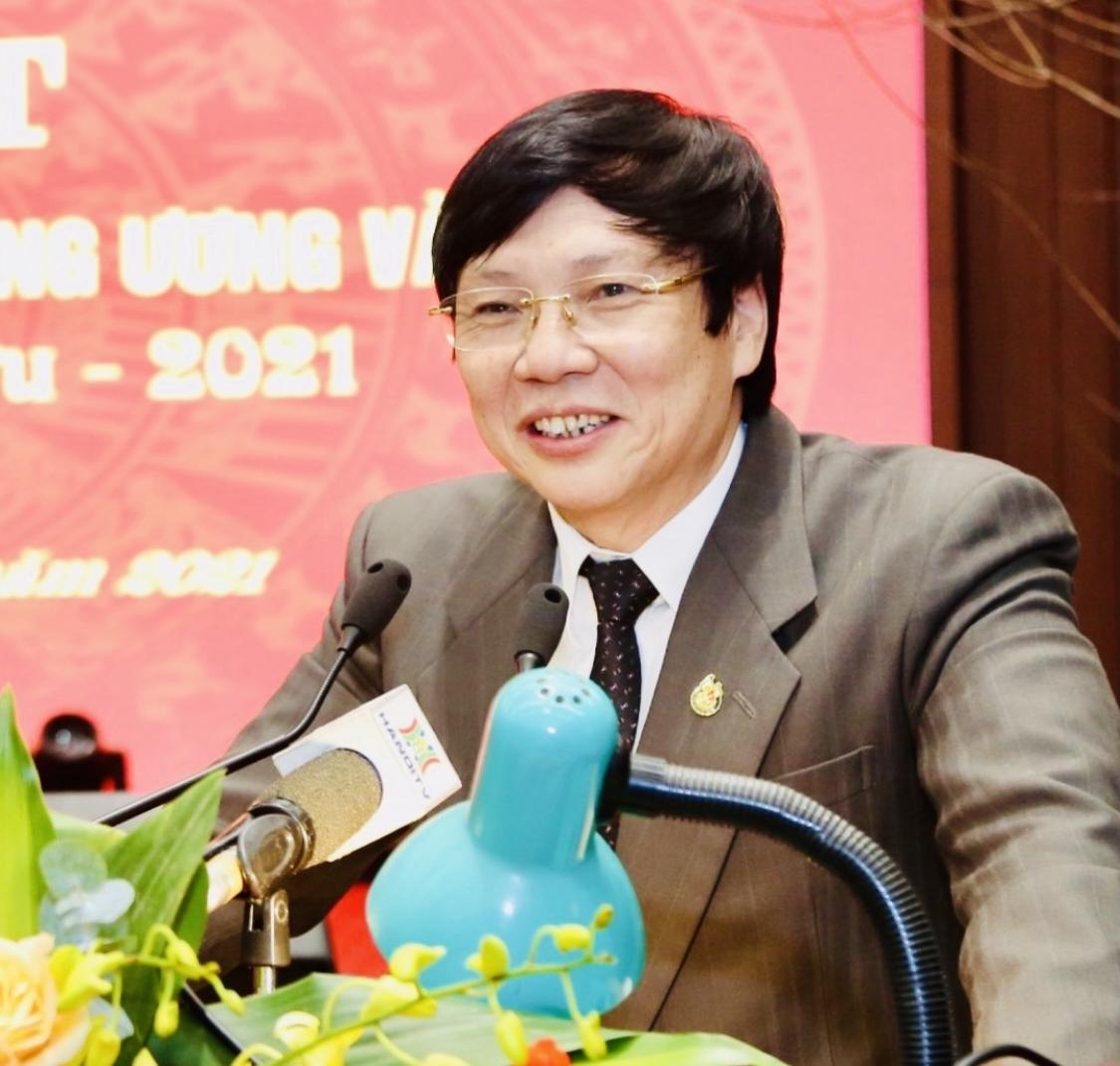 |
| Journalist Ho Quang Loi. |
Journalist and Culturalist Phan Quang, in his introduction to Ho Quang Loi's book "Vietnam on the Waves of Current Events", wrote: "Ho Quang Loi stands out with many excellent works on international commentary, perhaps that's why not many people have had the opportunity to read him in full. Truly worthy of being a son of Quynh Doi village, the hometown of poetess Ho Xuan Huong - Queen of Nom Poetry, along with many famous people in many fields, Ho Quang Loi has clearly shown his style through the genres of commentary, editorials, treatises, political memoirs, essays and even when answering interviews and dialogues on domestic topics... Mentioning turning points in the country's foreign relations requires the sensitivity of those who plan and operate national policies, or current issues with "foreign elements" such as the US House of Representatives' wrongful passing of the "human rights in Vietnam" bill, the plot of "peaceful evolution", "transformation strategy", or the fact that some elements at home and abroad are taking advantage of religious issues to cause trouble. In a chaotic world, Ho Quang Loi always maintains a sharp and sharp writing style, with reason and emotion. When discussing historical events such as the Thousand Years of Thang Long - Hanoi, promoting the core of the original culture, his way of expressing himself is concise, profound, meticulous, attractive, creating sympathy... What he has written recently is soft, multi-dimensional, sparkling with literary quality - which can be understood to be more or less depending on the author's new position. The resilience, determination, studiousness, perseverance - the inherent virtues of Nghe people have been further cultivated, blended with the gallantry, elegance, sophistication of the Thang Long scholars, with the soul of Hanoi from the love of flesh and blood"...
For more than 40 years as a journalist, he has contributed and published thousands of journalistic works and dozens of books as monumental cultural research works. Some of them include: "Global Breakthrough", "The Unknown of the Times", "The Shock of the Era of Mutation", "Rolling Horizons", "Vietnam on the Waves of the Times", "Hanoi - the Construction of the Spirit of the Times", "The World and the Perspective", "Russia - Journey to the Future", "The Times and Culture"... I call these works of cultural research of great stature and modernity. And I also want to borrow the words of Professor, Hero of Labor Vu Khieu to evaluate "Ho Quang Loi is a journalist, writer, steadfast politician, and erudite culturalist" so that from now on, in addition to the title of Journalist Ho Quang Loi, we have enough authority to call him "Culturalist Ho Quang Loi"!
Hanoi August 2021
